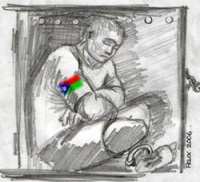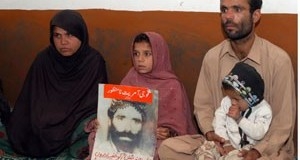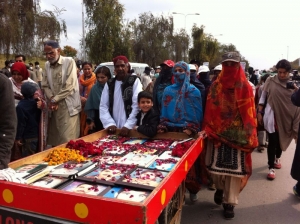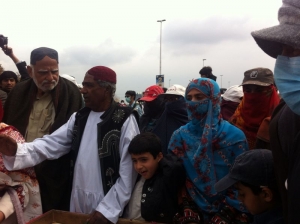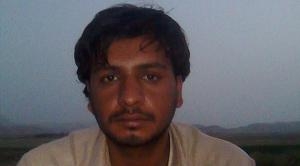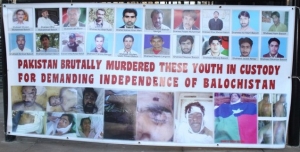By Khalid Hayat Jamaldini
Torture and kidnapping of the Baloch in Balochistan by law enforcement agencies, especially the paramilitary forces, has become common practice in the last few years. They kidnap us, arrest us on false charges, torture us, brutally murder us and then throw our corpses away. Many of us are still missing. The reasons behind these incidents are that we are Baloch by ethnicity and we are continuously demanding for the respect of our rights and the recognition of our identity. This mistreatment happens to the Baloch at all levels; rich and poor, educated and uneducated.
On April 8, I also had to go through the torture process by paramilitary forces in Quetta. It happened when I left my hometown, Noshki. When we reached Quetta, the van was stopped a couple of times by paramilitary forces. Each time the same questions were asked, “Where is the van coming from and what is in your bag?” Each time the driver and passengers told them that we came from Noshki, and I had to tell them my bag carried “one laptop and two clothes”.
After the van dropped us off at its final destination, I had to catch a rikshaw to take me to the place where I was supposed to spend the night. On the way, I was again stopped several times and the same questions were asked. My reply was the same every time. And I was asked to get off the rikshaw and open my bag to prove that I was telling the truth. I really got sick and tired of zipping and unzipping the bag. Therefore, I left my bag open. Having almost reached my destination, I was again stopped by the forces, and had to go through the same process. This time I told them, “This is what I have in my bag and you can check it, but I am not going to open it for you. You are welcome to do it yourself.” The soldier disliked my reply and started to shout at me while threatening to punish me in a way that I have never thought of before. I asked him to let me speak to his officer as I found his behaviour offensive.
When he did not return immediately, I went to look for him to resolve the problem myself so that I could leave. When I found him, I overheard him telling his officer not to release me because he wanted to teach me a lesson as I was trying to be “smart”. By now I asked to see their senior officer. They told me that he was about to arrive soon and that they have already decided what to do with me. I was mentally prepared to face the consequences of my actions and I recalled what I have heard from other Baloch who had experienced brutal behaviour towards them; their stories are true.
A few minutes later, the major arrived in a red Toyota four-wheeled pickup, with gunmen, followed by a one-door pickup full of armed men. The latter welcomed the major, and thereafter asked me to see him. The major, who looked like a “practising Muslim” with a long beard, greeted me and asked for my name. The major’s name was Asim, according to his nametag. I started the conversation in English and told me that his men had lodged a complaint against me.
I replied, “Major, it is good that they have someone who listens to them. To whom and where should I complain about their rude behaviour that I have faced since I came to this city?”
We went further and discussed the issue. I told him that I was carrying my laptop and two clothes in this bag and that I have zipped and unzipped it several times since I came to the city. I said: “I have just told your solider the same story and if he wanted to check whether it is true, he is welcome. However, I am not going to open it for him, because I am tired. He has taken my words as an insult, because he is in uniform.”
The major said that his men were standing there to ensure the security of the population and they were asked to do so by the provincial government. I replied, “We appreciate what you people are doing, but it does not mean that you have to get on our nerves. We also get tired of being disrespected in the name of security.”
His people started to search my bag and within a second or two without opening the other pockets they showed Asim a piece of marijuana wrapped in a plastic bag. I was already prepared to face all this when they were discussing among themselves that they wanted to teach me a lesson. After showing it to the major, he asked if I was indeed in possession of the drug.
The major asked for my close friends’ contact numbers, which I refused to give him, because I did not want to get them involved in this trouble. I gave him my elder brother’s contact number. I told the major that he was not in the city so that there was no reason to worry him. He dialed my brother’s number and I could not hear what he was saying as he moved away from me. After a minute or so, my brother called me saying that someone by the name of Asim had called him and said that “Khalid had an accident and he is suffering from serious head injuries”.
Asim ordered his gunmen to take me to the police station and launch an FIR. I responded by saying it was a mistake for me to think he was an educated person.
Now I had to face the beating by his soldiers. All of them wanted to take part in beating me and to prove to their boss how loyal they are to him. They dragged me to their pickup and took me to the police station to launch the FIR. In the FIR they wanted to mention that drugs were found on me, that I have shamed Pakistan and that I have misbehaved towards the officers in uniforms and snatched the tags on their shoulders.
Suddenly, a friend of mine, a lawyer by profession, entered the room and saw me sitting on the bench. He was there to release his client and when he saw the paramilitary forces, he just kept silent for a few seconds and said to me in Balochi, “Khalid, I just pray for the day when we are no longer their victims.”
The lawyer negotiated my release and told me that as a friend, he did not want to embarrass me in front of them. He said he knew all the “dirty games” they played with the Baloch, which was why he did not want to hand me over to them.
I have travelled around the world, including the US and the UK, but I have never been treated in such a disrespectful manner, neither at the immigration nor by their citizens. However, in my own country I have being asked 10 times in one single hour to prove my identity.
http://www.dailytimes.com.pk/default.asp?page=201094story_4-9-2010_pg7_27

